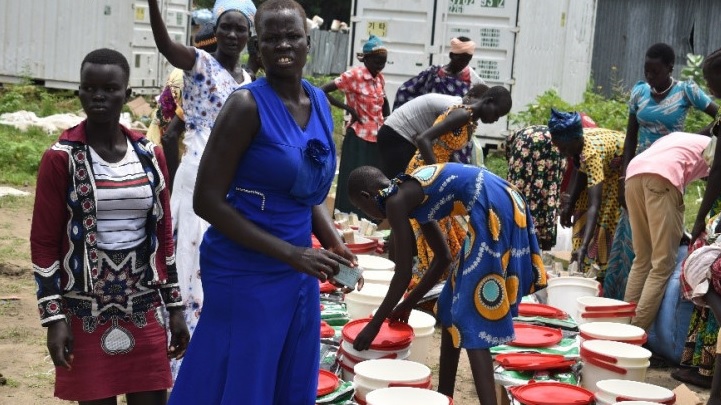
Recent armed violence in Jonglei State and Greater Pibor Administrative Area has forcibly uprooted thousands of people from their homes and left entire areas without access to medical care, while heavy flooding and the COVID-19 pandemic have made it more difficult for humanitarian organizations to deliver assistance. The International Committee of the Red Cross (ICRC) fears that those living in remote areas are at grave risk of malnutrition and disease, as some areas are impossible to reach due to flooding.
“After weeks of armed violence, the scale of the humanitarian impact on communities is emerging,” said Wolde-Gabriel Saugeron, the head of the ICRC’s subdelegation in Bor. “Our teams started to carry out assessments in places we can safely access, but heavy rains and flooding made some areas very difficult to reach by land or air. We are deeply worried for the sick and injured who are going without care.”
People seeking refuge around Bor following armed violence and floods are also vulnerable to severe food insecurity and waterborne disease. Many are relying on humanitarian assistance to feed their families and do not have enough money to purchase food at the market.
“I am living with my children in an abandoned home,” said Athiong Manyok, 33, a mother of six, who lost her husband in the recent violence. “The house leaks when it rains and there are a lot of mosquitoes. I wash dishes at the market for me to raise something to enable me to buy food for my children. Now I have been made a widow because of this violence and I have to start learning a new way of living without my husband.”
Between 6 and 12 August 2020, the ICRC and the South Sudan Red Cross (SSRC) provided blankets, sleeping mats, mosquito nets, buckets, kitchen sets, tarpaulins and soap to 840 families in Bor town. Most of them were women, children, and the elderly who fled attacks in Twic East, Duk and South Bor areas of Jonglei State and sought shelter in public spaces such as churches and schools in Bor town.
“I saw women and children lying dead in the market,” said Garang Aruong Akech, 60, who fled his village with his family to Bor town. “We walked in water for seven days with nothing to eat before reaching Bor.”
Many people suffered from gunshot injuries in the latest round of clashes to hit the state. The ICRC-supported hospitals in Akobo and Juba have cared for 86 patients suffering from gunshot wounds since June despite limitations created by the COVID-19 pandemic. The bed-capacity in both hospitals’ surgical wards have been reduced to follow physical distancing guidelines. This reduces the number of patients that can be admitted into the wards at any given time.
The wide-scale flooding on top of weeks of armed violence prompted the government of South Sudan on 13 August 2020 to announce a state of emergency in Jonglei State and Greater Pibor Administrative Area. The ICRC, together with the SSRC, plans to continue assessments to see how best to address humanitarian needs in the coming weeks to help communities hit by both clashes and floods meet their day-to-day needs.
Humanitarian concerns
The recent fighting forced thousands of people to flee their homes into the bush or other towns and cities. Many families arrived in Bor, Pibor, Marwa Hills and Jebel Boma to escape the violence. Those seeking safety in Bor are living in public spaces like schools and churches without adequate shelter, food, and basic supplies.
This is further complicated by flooding in parts of Jonglei State and Greater Pibor Administrative Area, which creates logistical challenges in reaching those in need. At the same time, thousands more people are being driven from their homes by floods.
The flooding creates a heightened risk of waterborne diseases such as cholera as well as malaria. Many of those living in the most affected areas are largely cut-off from assistance and lack safe drinking water and medical care.
Most of the violence-affected communities in Jonglei State and Greater Pibor Administrative Area are facing severe food insecurity and are reliant on humanitarian assistance. These needs will likely continue through the harvest period as cultivated farmland and animals have been lost in fighting and floods.
COVID-19 cases continue to rise in South Sudan. The virus is harder to fight when communities are forcibly displaced from their homes, as preventive measures such as handwashing and physical distancing can be more difficult for people to follow.
Operational notes
During the peak of the fighting, the ICRC provided medical supplies to staff at Bor and Panyagor County Hospitals, and a primary health care center in Duk Padiet to help with the treatment of trauma injuries.
Our surgical teams in Akobo and Juba treated 86 patients suffering from gunshot wounds since June (56 patients in Akobo and 30 in Juba). The COVID-19 pandemic forced the ICRC to reduce the number of beds in the surgical wards by more than 50 per cent so that physical distancing measures can be followed.
The ICRC and SSRC between 6 and 12 August provided essential household items such as sleeping mats, mosquito nets, kitchen sets, and tarpaulins to more than 5,000 people displaced by the armed violence who are now seeking refuge in Bor town.
Further humanitarian assistance is required as many more people have been displaced by the floods. Our teams will be assessing the most pressing needs in these coming days to inform our response.